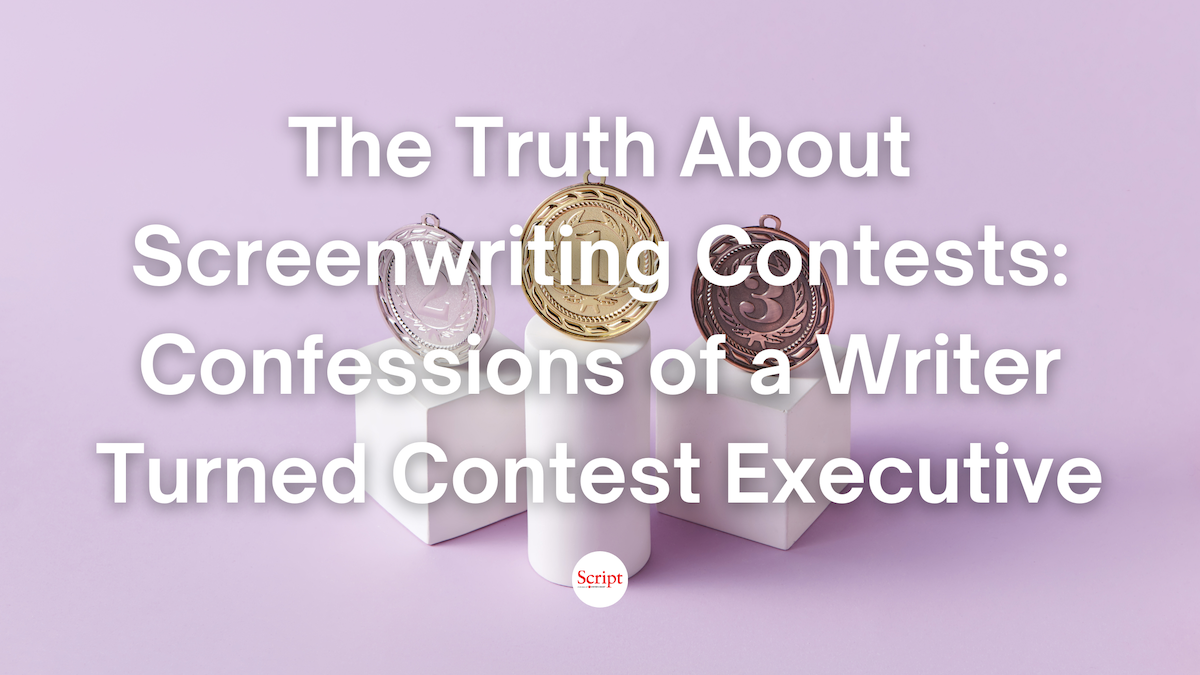Balls of Steel™: Pitching Tips
No matter how seasoned you are, pitching leads to anxiety. Here are some tips to help you have a successful screenwriting pitchfest experience.
Pitching anxiety. We all get it. I bet even the pros get a teeny knot in their stomach. Honestly, I hope I never lose the barb that snags at my insides. It keeps me on my toes.
This weekend, I’m heading to the Great American Pitchfest(GAPF) in Burbank to not only lecture but also to pitch. Yes, despite the contacts I have made at studios and production companies, I am pitching at a pitchfest. Why? Because it’s a great way to get your foot in the door and make connections with new executives.
It’s not about the sale of one idea; it’s about creating a relationship with new producers, submitting polished work that knocks their socks off, and making a great first impression to show them you’re a pro.
First step: Be prepared.
I don’t care how seasoned you are, there’s prep work involved in presenting your script for a possible sale.
Here’s what I always bring to an event:
Business cards: Typically, I put my name, email, website URL, and cell number on one side, and on the back, the name of my script. When we pitched Slavery by Another Name, one side of our card had contact info (as if it were the front page of the script), and the other side, this haunting image...
There’s no way they’d forget what our story was about when they sorted through their stack of cards at the end of the day. But no worries if you don't have a picture that speaks 1,000 words. Just keep the card simple.
One-Sheet: The one sheet is an important item to leave behind. There’s no way an executive will remember every pitch they heard, and often, they need to regurgitate the pitches to their bosses. Why not help them pitch yours accurately?
The only time I don’t leave one behind is if, in the conversation, I learned of an angle the executive preferred over what I had written. This is why it’s critical to shut up and listen when the executive talks during your pitch. You might discover they want a female protagonist instead of a male, or someone 20 years younger. If you hand over that one sheet with the wrong protagonist on it, it’ll end up in the “pass pile” when you could have easily switched up your characters and possibly gotten a “recommend.” Tell them you ran out of one sheets and will email them one... which gets you their email address. See how this works?
Doing something right is better than doing something right now.
You might want to read that last line again. That also holds true for pitching a script that isn’t ready. If you do, and they ask for it, DO NOT SEND IT! Instead, rewrite it. You can usually get away with sending it three to four weeks after the event. The reality is, they’ll be inundated with script submissions after. They won’t notice yours isn’t in the pile.
Trust me, they’d rather read a great script than an unpolished one. They’ll be more than happy to wait.
Also, even if my script is ready, I do not hand them a printed copy. No one wants to lug it around, plus you want their email address for your files so you can follow up. You won’t always get that if you slip them the script on the spot.
They’d rather read scripts on their iPads anyway. I know I would.
Notepad: As I walk away from each executive, I scribble notes as to what was discussed and what follow-through they wanted. When you’re at a pitching event, potentially seeing dozens of people, you need to be organized. Of course, you can use a phone app for this too. Whatever works.
Water: Dehydration leads to writer roadkill.
Stay an extra night… at least. This way, you can celebrate the success without having to race to the airport. When my schedule allows, I tack on a couple of extra days to take meetings and connect with my existing network who weren’t at the event.
For even more tips, check out two posts I wrote for last year’s GAPF. They’re a must:
- First Impressions - outlining the do's and don'ts of making a great first impression when pitching.
- Managing Expectations - warns of the need to curb your enthusiasm and have realistic expectations post pitchfest.
- Checklists for Pitchfests and Conferences - everything you need to doublecheck your readiness.
You might as well learn from my mistakes.
If you’re in Burbank this Saturday, June 2nd, stop by the airport Marriott and take some free classes. I’ll be lecturing with Richard "RB" Botto of Stage 32 on Breaking in Outside of Hollywood. If you can’t make the trip, you can still get my tips via the On Demand webinar from The Writers Store.
But that’s not all – I’ll also be interviewing Doug Richardson (Die Hard 2, Bad Boys, Hostage) on stage! Hear the war stories he shares in his ScriptMag column, Behind the Lines with DR, right from his mouth. And you can watch us drink scotch.
If you can’t make it at all, no fear, Screenwriters World Conference (SWC) is in October, and you’ll have a shot at more classes and pitching even more executives then. I'll be speaking at that event too, as will tons of amazing lecturers, so be sure to check the schedule.
Pitching is important to do more than once a year, so please put the SWC on your calendar. One of the great benefits of pitchfests is to have a deadline to get a script ready by.
Work on your pitches, get your work polished, and take that important step to fulfilling your dream. That script ain’t gonna sell itself.
Above all, don’t forget to say, "hi" if you see me. I don’t bite… well, maybe just a nibble.
Get your FREE Pitchfest Checklist to increase your chances of pitching success!
Watch ScriptMag Editor Share Her Advice on Facing Your Writing Fears
Jeanne Veillette Bowerman shares her personal story of facing her fears in order to propel her writing and her career. Click on the image below to watch Jeanne's advice. In just eight minutes, you might have a whole new perspective.
Jeanne Veillette Bowerman is a Senior Executive at Pipeline Media Group and Book Pipeline, Editor-in-Chief of Pipeline Artists, Director of Symposium—a year-round conference in the arts, co-host "Reckless Creatives" podcast, partner at Fringe Press, former Editor-in-Chief of Script magazine and a former Senior Editor at Writer's Digest. Recognized as one of the "Top 10 Most Influential Screenwriting Bloggers," her "Balls of Steel" column was selected as recommended reading by Universal Writers Program. A compilation of her articles is now available at The Writers Store—Balls of Steel: The Screenwriter's Mindset. She is also Co-Founder and moderator of X's weekly screenwriters’ chat, #Scriptchat, and wrote the narrative adaptation of the Pulitzer Prize-winning book, Slavery by Another Name, with its author, Douglas A. Blackmon, former senior national correspondent of The Wall Street Journal. More information can be found on her website. X: @jeannevb | IG/Threads: @jeannevb_ | BlueSky: @jeannevb.bsky.social





![The Era of the Multi-Hyphenate: An Interview With Writer and Filmmaker Mario O. Moreno [SERIES]](https://scriptmag.com/uploads/MjEzMTEyNzA4NjQ2NTc3NjE1/the-era-of-the-multi-hyphenate-series-script-hero.png?format=auto&optimize=high&width=1440)

